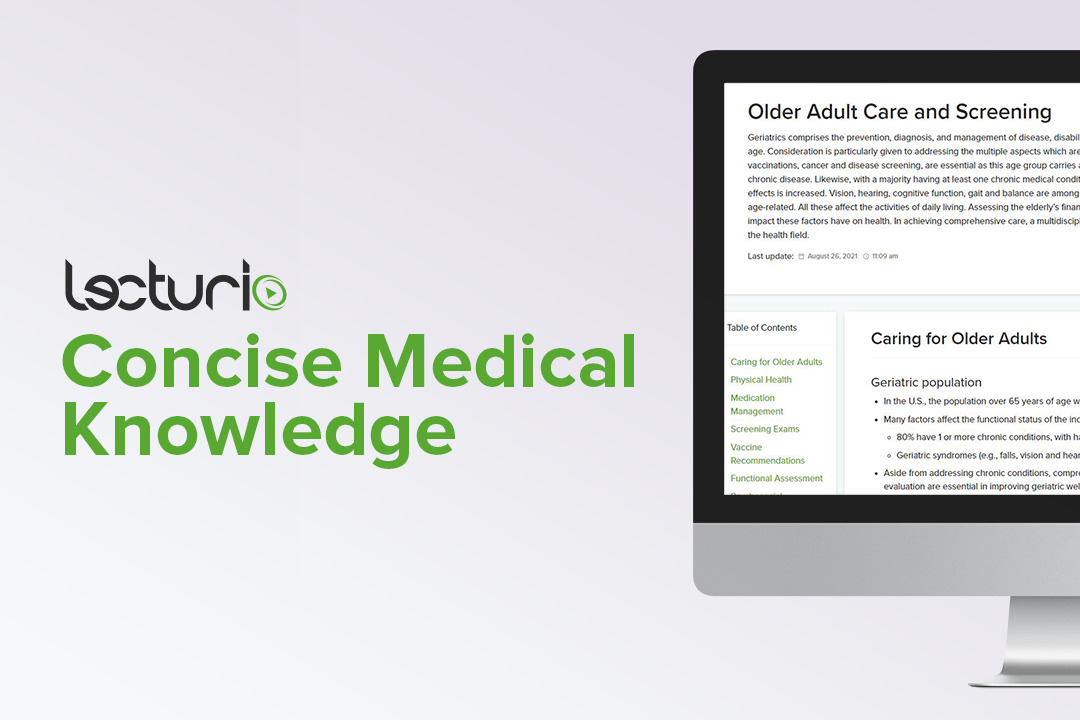Playlist
Show Playlist
Hide Playlist
Nutrition, Hearing and Vision, Falls
-
Slides OlderAdults GeriatricCare.pdf
-
Download Lecture Overview
00:00 What about nutrition in older adults? In general, appetite and body weight decline with age and there is this reduction in lean mass and it’s replaced by fat mass. 00:11 That process continues during middle age through older adulthood until about age 65 to 70 years when it tends to stabilize. 00:20 Unintentional weight loss is a pretty common condition among older adults and it is associated with a higher risk for morbidity and mortality. 00:29 So, why do older adults lose weight? Of course, the big worry is cancer. 00:34 So, we have to think about the concept of an undiagnosed tumor in promoting weight loss. 00:40 I think much more commonly, it's due to psychiatric effects, depression and cognitive effects, early dementia. 00:50 And those are the reasons we might see some weight loss. 00:53 Don't forget about medications cause, many of which promote nausea or may cause constipation. 01:02 That can reduce appetite. 01:04 And then social isolation and changes in their social environment. 01:08 I always find that losing a special loved one, especially if they lived with that individual, is a high risk for weight loss. 01:17 And so, I've definitely seen that multiple times. 01:20 And that's where you want your social worker to be involved and/or a counselor, mental health professional. 01:27 But that said, in nearly 30% of cases, and depending on what study you’re looking at, the cause of the weight loss is unexplained. 01:37 So, standard workup for these patients with unexplained weight-loss, CBC, comprehensive metabolic panel, a TSH, a sed rate, lactate dehydrogenase level which is – can be a sign of tumor breakdown, and urinalysis. 01:52 So, one thing to consider would be an abdominal ultrasound for these patients looking for a tumor, but it’s a also good chance – again, if they have – particularly, if they have a good five-year life expectancy, maybe it's time to go and readdress. 02:06 You know, you never did get that second round of colorectal cancer screening. 02:10 We should order today. 02:11 Or breast cancer or whatever cancer has been left unscreened. 02:14 Maybe this is a good impetus to do it. 02:17 Let’s talk about hearing and vision among older adults. 02:19 Presbycusis is a very common condition. 02:23 It almost seems to be universal among older adults, and so that's usually associated with a high frequency hearing loss. 02:31 Yet, the Preventive Service Task Force recommends asking seniors about their hearing, but no objective testing is necessary on a broad basis. 02:39 For patients who failed – come in, I can’t hear as well, you put them through audiometry, usually it's a high-frequency hearing loss. 02:49 They should be referred to otolaryngology for anything like a failed hearing test if they have chronic otitis media or they have – certainly, if they have sudden hearing loss, but the treatment is usually going to be hearing aids for presbycusis. 03:03 And then also watch out for conditions such as macular degeneration for your exam. 03:07 It’s very important, macular degeneration versus a cataract, which is the central visual loss. 03:15 But the Preventive Service Task Force recommends against routine ophthalmoscopy, looking for evidence of any of these conditions. 03:24 Now, falls are an important cause of morbidity and mortality among older adults. 03:31 In 2014, it’s estimated that 27,000 seniors died related to falls. 03:37 And nearly a third of US seniors experienced a fall in 2014 and a third of those cases required medical attention. 03:46 So, they’re pretty serious. 03:48 So, one thing I really like is the Tinetti balance and gait evaluation. 03:53 The get up and go test is another term for this. 03:56 It's sitting in a chair, then getting up, walking 10 feet in front of you, turning around, walking back and sitting down. 04:04 So, if the timing on that is under 16 seconds, that's normal. 04:09 There are actually some nomograms that give patients a little bit more time based on their age. 04:15 So if they’re 94, they may not be able to the Tinetti test in the same time the 68-year-old does it. 04:22 But a good general rule on my practice is, if it's 15 seconds or less, they’re okay. 04:29 What does that mean they’re okay? It means that their risk of falling is lower. 04:33 They shouldn’t have a high risk of falls based on this evaluation. 04:37 That test has demonstrated good sensitivity for fall risk. 04:41 What should we be doing to prevent falls? For those patients with a positive Tinetti test and/or who have a history of fall, that's the best predictor as a history of previous fall. 04:51 Think about physical therapy and activity with targeted training. 04:55 So, a lot of times, they will have to – it's not just about doing just general exercise. 04:59 Try to do some targeted training and that’s where the physical therapies comes in. 05:04 Vitamin D isn't just healthy for bones. 05:06 It can actually help prevent falls. 05:08 So, these patients should be taking vitamin – all older adults should be taking a vitamin D and getting enough vitamin D in their diet. 05:16 And then securing the household environment. 05:17 This is something that a home visit can be really helpful to do. 05:22 So, avoiding clutter, avoiding loose rugs, those things that make people suffer mechanical falls. 05:27 And then thinking about assistive devices as well as equipment in the home such as a bedside commode, shower chair and grab bars that can prevent falls at the most frequent sites of serious falling. 05:41 Let’s talk about smart prescribing among older adults. 05:45 So, over a third of adults at age 60 or more take five or more prescriptions per day. 05:50 About half also take over-the-counter drugs at the same time. 05:55 There is a significant risk of drug-drug interactions. 05:59 About 1 in 20 – if you just take a bunch of random adults and pluck out their medications, about 1 in 20 has a risk of a serious drug-drug interaction. 06:09 And it's thought that 30% of admissions due to delirium and falls and also unnecessary hospital admissions are due to inappropriate drug interactions and/or side effects.
About the Lecture
The lecture Nutrition, Hearing and Vision, Falls by Charles Vega, MD is from the course Geriatric Care. It contains the following chapters:
- Nutrition in Older Adults
- Hearing and Vision
- Falls and Prevention
- Smart Prescribing for Older Adults
Included Quiz Questions
In most healthy adults, all of the following changes can be anticipated with normal aging except...
- Increase in weight
- Decrease in muscle mass
- Increased probability of fracture
- Decreased sexual activity
Which of the following tests is LEAST LIKELY to contribute to diagnosis in an elderly man who presents with significant weight loss without other findings?
- Lipase
- Thyroid stimulating hormone
- Complete blood count
- Complete metabolic panel
- Lactate dehydrogenase
What is the most common type of hearing loss among the elderly?
- Bilateral sensorineural hearing loss
- Unilateral sensorineural hearing loss
- Bilateral conductive hearing loss
- Unilateral conductive hearing loss
- Unilateral mixed hearing loss
Despite lack of consensus, what is the most appropriate age for hearing loss screening in the asymptomatic adult?
- 65 years
- 55 years
- 45 years
- 35 years
- 25 years
What is the application of the Tinetti Assessment Tool?
- Assessment of balance and gait
- Assessment of hearing
- Assessment of vision
- Assessment of cognitive function
- Assessment of social functioning
Approximately what proportion of older adults take five or more prescription medications a day?
- 40%
- 20%
- 60%
- 80%
Customer reviews
5,0 of 5 stars
| 5 Stars |
|
5 |
| 4 Stars |
|
0 |
| 3 Stars |
|
0 |
| 2 Stars |
|
0 |
| 1 Star |
|
0 |




